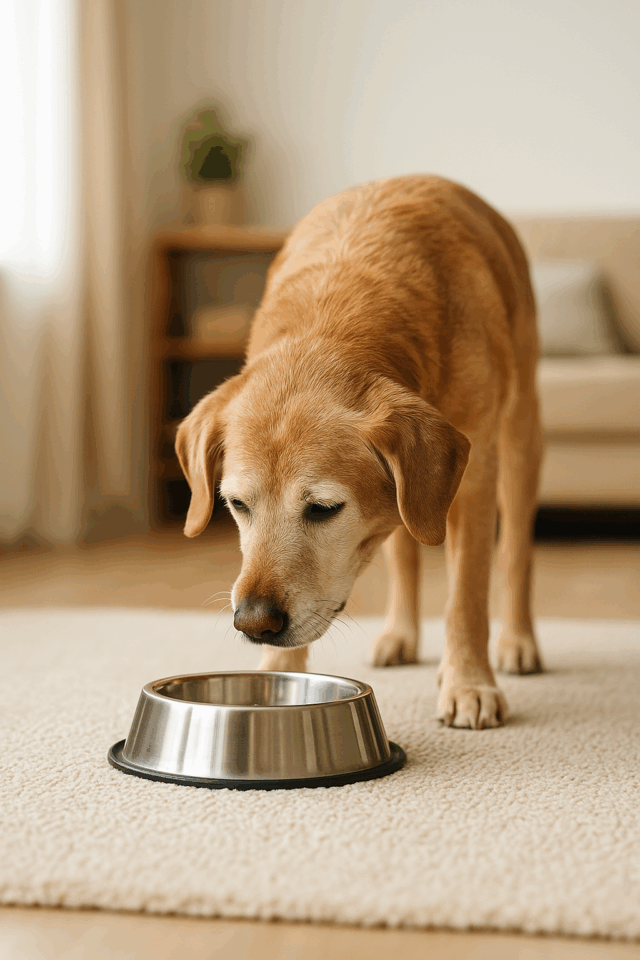
A dog’s nutritional needs change as they age. Just like people, senior dogs face new health challenges over time. They need a different diet than younger dogs.
Feeding an older dog the same way you fed them as a puppy is not ideal. Their metabolism, activity level, and digestion change. Adjusting their diet can help them live longer and feel better in their golden years.
Understanding the Aging Process in Dogs
Dogs age faster than humans. By age seven, most dogs are considered seniors. Large breeds may become seniors earlier, around age five. https://happymutt.org/geriatric-dogs-deserve-very-special-care/
Aging affects energy levels, joint health, digestion, and the immune system. These changes create different dietary requirements compared to younger dogs.
Calories and Metabolism: Less Is Often More
Senior dogs usually have slower metabolisms. They often move less and sleep more than younger dogs. This means they burn fewer calories.
Feeding them a diet high in calories can lead to weight gain. Obesity increases the risk of arthritis, diabetes, and heart disease. Senior dogs typically need fewer calories, not more.
Protein: Still Important, but the Right Kind
Many people think older dogs need less protein. In reality, high-quality protein is essential for maintaining muscle mass in seniors.
The protein should be digestible and come from good sources like fish, chicken, or lamb. Older dogs with kidney problems may need their protein intake adjusted under veterinary guidance.
Fiber for Digestive Health
Digestive systems slow down with age. Senior dogs may have trouble with constipation or irregular bowel movements.
Fiber helps promote healthy digestion. Look for senior dog foods with natural fiber sources like beet pulp, pumpkin, or brown rice.
Joint Support: Glucosamine and Omega-3 Fatty Acids
Arthritis and joint stiffness are common in older dogs. Their diet should support joint health to keep them comfortable.
Ingredients like glucosamine, chondroitin, and omega-3 fatty acids help reduce inflammation and support mobility. Many senior dog foods include these supplements.
Maintaining a Healthy Weight
Keeping your senior dog at a healthy weight is crucial. Excess weight puts pressure on their joints and organs.
Choose foods labeled for “senior” or “weight management.” Avoid table scraps and high-fat treats. Stick to regular portion sizes and avoid overfeeding.
Dental Health and Food Texture
Many older dogs have dental issues. They may have missing teeth or gum disease, which can make chewing dry food difficult.
Wet food, softened kibble, or smaller kibble sizes can make eating easier. A veterinarian can help you choose the best option. https://happymutt.org/the-importance-of-dental-care-for-dogs-preventing-health-problems/
Hydration Still Matters
Older dogs are prone to dehydration. Their sense of thirst may decline as they age.
Wet food can help increase water intake. Always provide fresh water and monitor their drinking habits. Signs of dehydration should be taken seriously.
Supplements and Special Considerations
Senior dogs may benefit from added supplements. Antioxidants, B vitamins, and probiotics can support cognitive and immune function.
Dogs with specific health conditions like kidney disease, heart problems, or diabetes need special diets. Consult your vet for tailored advice.
When to Switch to Senior Dog Food
The right time to switch depends on your dog’s size and health. Large breeds often switch sooner than small breeds.
Some signs your dog may benefit from senior food include weight gain, stiffness, lower energy, or dental problems. Talk to your vet before making a change.
Homemade vs. Commercial Senior Dog Food
Homemade diets give you control over ingredients. But they require planning and guidance to ensure balanced nutrition.
Commercial senior dog foods are convenient and designed to meet older dogs’ needs. Choose brands with high-quality ingredients and veterinary approval.
Keep an Eye on Behavior and Health
Changes in eating habits, energy, or bathroom patterns could indicate a dietary issue. Regular vet checkups are essential.
Be patient and observant. Your senior dog depends on you to help them age gracefully and stay comfortable.
Final Thoughts on Why Senior Dogs Need a Different Diet Than Younger Dogs
A proper diet can greatly improve your senior dog’s quality of life. Nutritional needs evolve with age, and their food should reflect that.
By feeding them thoughtfully, you’re not just giving them meals—you’re giving them more happy, healthy years with you.
Sources:
- American Kennel Club. “Nutrition Tips for Senior Dogs.” https://www.akc.org
- VCA Animal Hospitals. “Senior Pet Nutrition.” https://vcahospitals.com
- PetMD. “Best Diet for Senior Dogs.” https://www.petmd.com
- Tufts University Cummings School of Veterinary Medicine. “Nutrition for Older Dogs.” https://vetnutrition.tufts.edu
- ASPCA. “Senior Dog Care.” https://www.aspca.org






